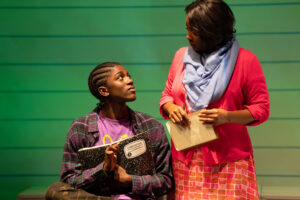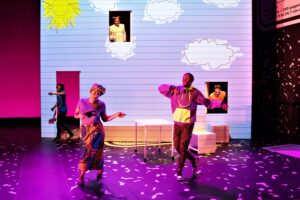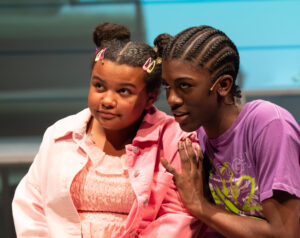
Junie Edwards (Lonnie) and Charla Marie Bailey (Mama/ Miss Edna/Miss Marcus) in ‘Locomotion’ at Children’s
Theatre Company (Photo/Glen Stubbe Photography)
BY STEPHANIE FOX
The latest production at the Children’s Theatre is “Locomotion,” a story about an 11-year-old Black boy, Lonnie, who is coping with loss and upheaval in his life. The story shifts back and forth between the present and Lonnie’s memories, both good and bad. He is living in a foster home with Miss Thelma and is separated from his younger sister, Lili. He has a poem inside him, but does not know how to bring it out. With encouragement from his teacher, Ms. Marcus, who encourages her students to express themselves in writing and poetry, Lonnie will learn to find his voice.
The play originally premiered at the Kennedy Center in 2010. Then, only three actors played all the characters. This production has five actors, with Junie Edwards playing Lonnie Collins Motion (hence his nickname, Locomotion); Ellis Dossavi as Lonnie’s friend, Enrique; Mollie Allen as Lonnie’s little sister, Lili; Charla Marie Bailey playing the female adult characters; and Darrick Mosley playing the adult male characters. During the evening I attended, two understudies played the younger characters, with Glenn E. Williams II as Enrique and Mari Peterson-Hilleque as Lili. Talvin Wilks directed this production.
Playwright Jacqueline Woodson adapted the stage production from her book “Locomotion.” “Lonnie’s voice was in my head,” she said. Some of Woodson’s favorite poets, such as Langston Hughes, influenced the play as did Woodson’s fifth-grade teacher, Ms. Vivo, who encouraged her to write, much like Lonnie’s teacher does for her students.

Cast of ‘Locomotion’ at Children’s Theatre Company (Photo/Glen Stubbe Photography)
Those attending “Locomotion” need to pay close attention. The action shifts quickly between times in Lonnie’s past to those in the present. The play also deals with tragic loss. For that reason, CTC does not recommend this production for children under the age of nine. In places, the play moves from the present day to the recent past and then into the far past in mere seconds. Sometimes, it’s not clear what has happened in one scene until later in the play. But that’s part of what makes this play interesting and persuasive.
The first scenes give some hint of what is to come. There are sounds of a fire and sirens blaring, but it isn’t until the end, when we learn that Lonnie’s parents died in a fire, that the audience can be certain of what actually happened. Losing his parents leaves Lonnie and his sister in the foster care system, passed from one household to another and still another. His current foster home is happier. He is living with a grandmotherly woman, Miss Thelma, in her apartment. Like most apartment buildings in Brooklyn, New York, there is a fire escape which Lonnie often uses to climb to the building’s roof with his thoughts and memories, a place where he can find peace.

Mollie Allen (Lili) and Junie
Edwards (Lonnie)
(Photo/Glen Stubbe Photography)
The play also focuses on Black lives. The history assignment from his teacher is to read about Brown vs. Board of Education. There is a moment when all the actors chant “Black like me!”, quoting a line from the Langston Hughes poem, “Dream Variations.” Keep that in mind when Lonnie meets Enrique, who becomes his best friend. The two boys play basketball and tease one another, including about Enrique’s bruises. The answer won’t be revealed until late in the play, but it means another loss for Lonnie.
Lonnie and Enrique both keep their secrets, never sharing them even with each other despite their close relationship. Even Lonnie’s good memories, from watching the sunrise with his father, to holding his baby sister, to the close relationship with his mother, are his own, shared only with the audience.
The play does not end with happily-ever-after, but the lives of Lonnie and those close to him become much more hopeful. He is still trying to become reunited with his little sister, and perhaps when he is older, can become her guardian. His foster mother Miss Thelma’s son returns from the Army, possibly home from a war, and he bonds with Lonnie, becoming almost like a big brother. And Lonnie’s teacher has opened him up to poetry and prose to the point that the poem deeply hidden in his head is finally allowed to come out, along with Lonnie’s gift for using poetry to find his way in the world.
“Locomotion” will be at the Children’s Theatre until March 5.






















